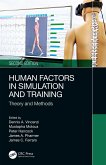Engineering Psychology and Cognitive Ergonomics
Volume 1: Transportation Systems
Herausgeber: Harris, Don
Engineering Psychology and Cognitive Ergonomics
Volume 1: Transportation Systems
Herausgeber: Harris, Don
- Gebundenes Buch
- Merkliste
- Auf die Merkliste
- Bewerten Bewerten
- Teilen
- Produkt teilen
- Produkterinnerung
- Produkterinnerung
This book describes some of the most recent advances and examines emerging problems in engineering psychology and cognitive ergonomics, bridging the gap between the academic theoreticians, who are developing models of human performance and practitioners in the industrial sector, responsible for the design, development and testing of new equipment and working practices.
Andere Kunden interessierten sich auch für
![Designing Culture Designing Culture]() Anne BalsamoDesigning Culture123,99 €
Anne BalsamoDesigning Culture123,99 €![Artificial Intelligence and Literary Creativity Artificial Intelligence and Literary Creativity]() Selmer BringsjordArtificial Intelligence and Literary Creativity206,99 €
Selmer BringsjordArtificial Intelligence and Literary Creativity206,99 €![Domain-Level Reasoning for Spoken Dialogue Systems Domain-Level Reasoning for Spoken Dialogue Systems]() Dirk BühlerDomain-Level Reasoning for Spoken Dialogue Systems81,99 €
Dirk BühlerDomain-Level Reasoning for Spoken Dialogue Systems81,99 €![Proceedings of International Conference on Communication and Computational Technologies Proceedings of International Conference on Communication and Computational Technologies]() Proceedings of International Conference on Communication and Computational Technologies426,99 €
Proceedings of International Conference on Communication and Computational Technologies426,99 €![Human Factors in Simulation and Training Human Factors in Simulation and Training]() Human Factors in Simulation and Training168,99 €
Human Factors in Simulation and Training168,99 €![Introduction to Human Factors Introduction to Human Factors]() Nancy J StoneIntroduction to Human Factors225,99 €
Nancy J StoneIntroduction to Human Factors225,99 €![Delivering Resilient Health Care Delivering Resilient Health Care]() Delivering Resilient Health Care206,99 €
Delivering Resilient Health Care206,99 €-
-
-
This book describes some of the most recent advances and examines emerging problems in engineering psychology and cognitive ergonomics, bridging the gap between the academic theoreticians, who are developing models of human performance and practitioners in the industrial sector, responsible for the design, development and testing of new equipment and working practices.
Hinweis: Dieser Artikel kann nur an eine deutsche Lieferadresse ausgeliefert werden.
Hinweis: Dieser Artikel kann nur an eine deutsche Lieferadresse ausgeliefert werden.
Produktdetails
- Produktdetails
- Verlag: CRC Press
- Seitenzahl: 480
- Erscheinungstermin: 23. Oktober 1997
- Englisch
- Abmessung: 234mm x 156mm x 27mm
- Gewicht: 844g
- ISBN-13: 9780291398369
- ISBN-10: 0291398367
- Artikelnr.: 57044631
- Herstellerkennzeichnung
- Libri GmbH
- Europaallee 1
- 36244 Bad Hersfeld
- gpsr@libri.de
- Verlag: CRC Press
- Seitenzahl: 480
- Erscheinungstermin: 23. Oktober 1997
- Englisch
- Abmessung: 234mm x 156mm x 27mm
- Gewicht: 844g
- ISBN-13: 9780291398369
- ISBN-10: 0291398367
- Artikelnr.: 57044631
- Herstellerkennzeichnung
- Libri GmbH
- Europaallee 1
- 36244 Bad Hersfeld
- gpsr@libri.de
Don Harris is the Senior Research Fellow in Human Factors Engineering in the Human Factors Group at the College of Aeronautics, Cranfield University, Bedfordshire,UK He is the founding convenor of the International Conferences on Engineering Psychology and Cognitive Ergonomics. He has written numerous papers, mostly in the field of human factors in aviation, edited Human Factors For Flight Deck Certification (Cranfield University Press, 1997) and has been a guest editor for the International Journal of Cognitive Ergonomics. He is a member of the Ergonomics Society and the International Association of Applied Psychologists. at the College of Aeronautics, Cranfield University, Bedfordshire,UK He is the founding convenor of the International Conferences on Engineering Psychology and Cognitive Ergonomics. He has written numerous papers, mostly in the field of human factors in aviation, edited Human Factors For Flight Deck Certification (Cranfield University Press, 1997) and has been a guest editor for the International Journal of Cognitive Ergonomics. He is a member of the Ergonomics Society and the International Association of Applied Psychologists.
Contents: Cockpit Interface Design Issues: Attentional issues in head-up
displays; A comparison of alternative helmet mounted flight control
displays; An evaluation of attitude symbology for helmet-mounted displays;
Altimeter design in avionics: analogue versus digital?; An evaluation of
alternative launch success zone formats in tactical pilot decision making;
Visual support for the control of unmanned platforms; An evaluation of
feedback requirements and cursor designs for virtual controls; Evaluation
of a virtual interface for a cockpit procedures trainer; GPS = got position
sussed?: some challenges for engineering and cognitive psychology in the
general aviation environment; Design and evaluation of a 4D navigation
display with direct manipulation; Error analysis as a means for user
interface evaluation: a comparison of graphically interactive and
traditional FMS user interfaces; Practicing what we preach; A method of
designing ergonomics for activity dynamics: an aeronautical example; A task
analytic approach to human centered flight deck design and evaluation;
Memory load and task interference: hidden usability issues in speech
interfaces; Human machine interactions with future flight deck and air
traffic control systems. Air Traffic Control: Proposal for a cognitive
model of en-route air traffic control; Situational awareness in air traffic
control: human cognition and advanced technology; Dynamic decision aiding:
the impact of adaptive automation on mental workload; Cognitive complexity
in management by exception: deriving early human factors requirements for
an envisioned air traffic management world; A cognitive model of expert
behaviour in an air traffic control task: enhanced speech recognition using
situational knowledge; Malvern Capacity Estimate (MACE) - a proposed
cognitive measure for complex systems. Aviation Psychology: The invariant
that drives conflict detection; Effects of mild hypoxia on decision making:
a signal-detection approach; A
displays; A comparison of alternative helmet mounted flight control
displays; An evaluation of attitude symbology for helmet-mounted displays;
Altimeter design in avionics: analogue versus digital?; An evaluation of
alternative launch success zone formats in tactical pilot decision making;
Visual support for the control of unmanned platforms; An evaluation of
feedback requirements and cursor designs for virtual controls; Evaluation
of a virtual interface for a cockpit procedures trainer; GPS = got position
sussed?: some challenges for engineering and cognitive psychology in the
general aviation environment; Design and evaluation of a 4D navigation
display with direct manipulation; Error analysis as a means for user
interface evaluation: a comparison of graphically interactive and
traditional FMS user interfaces; Practicing what we preach; A method of
designing ergonomics for activity dynamics: an aeronautical example; A task
analytic approach to human centered flight deck design and evaluation;
Memory load and task interference: hidden usability issues in speech
interfaces; Human machine interactions with future flight deck and air
traffic control systems. Air Traffic Control: Proposal for a cognitive
model of en-route air traffic control; Situational awareness in air traffic
control: human cognition and advanced technology; Dynamic decision aiding:
the impact of adaptive automation on mental workload; Cognitive complexity
in management by exception: deriving early human factors requirements for
an envisioned air traffic management world; A cognitive model of expert
behaviour in an air traffic control task: enhanced speech recognition using
situational knowledge; Malvern Capacity Estimate (MACE) - a proposed
cognitive measure for complex systems. Aviation Psychology: The invariant
that drives conflict detection; Effects of mild hypoxia on decision making:
a signal-detection approach; A
Contents: Cockpit Interface Design Issues: Attentional issues in head-up
displays; A comparison of alternative helmet mounted flight control
displays; An evaluation of attitude symbology for helmet-mounted displays;
Altimeter design in avionics: analogue versus digital?; An evaluation of
alternative launch success zone formats in tactical pilot decision making;
Visual support for the control of unmanned platforms; An evaluation of
feedback requirements and cursor designs for virtual controls; Evaluation
of a virtual interface for a cockpit procedures trainer; GPS = got position
sussed?: some challenges for engineering and cognitive psychology in the
general aviation environment; Design and evaluation of a 4D navigation
display with direct manipulation; Error analysis as a means for user
interface evaluation: a comparison of graphically interactive and
traditional FMS user interfaces; Practicing what we preach; A method of
designing ergonomics for activity dynamics: an aeronautical example; A task
analytic approach to human centered flight deck design and evaluation;
Memory load and task interference: hidden usability issues in speech
interfaces; Human machine interactions with future flight deck and air
traffic control systems. Air Traffic Control: Proposal for a cognitive
model of en-route air traffic control; Situational awareness in air traffic
control: human cognition and advanced technology; Dynamic decision aiding:
the impact of adaptive automation on mental workload; Cognitive complexity
in management by exception: deriving early human factors requirements for
an envisioned air traffic management world; A cognitive model of expert
behaviour in an air traffic control task: enhanced speech recognition using
situational knowledge; Malvern Capacity Estimate (MACE) - a proposed
cognitive measure for complex systems. Aviation Psychology: The invariant
that drives conflict detection; Effects of mild hypoxia on decision making:
a signal-detection approach; A
displays; A comparison of alternative helmet mounted flight control
displays; An evaluation of attitude symbology for helmet-mounted displays;
Altimeter design in avionics: analogue versus digital?; An evaluation of
alternative launch success zone formats in tactical pilot decision making;
Visual support for the control of unmanned platforms; An evaluation of
feedback requirements and cursor designs for virtual controls; Evaluation
of a virtual interface for a cockpit procedures trainer; GPS = got position
sussed?: some challenges for engineering and cognitive psychology in the
general aviation environment; Design and evaluation of a 4D navigation
display with direct manipulation; Error analysis as a means for user
interface evaluation: a comparison of graphically interactive and
traditional FMS user interfaces; Practicing what we preach; A method of
designing ergonomics for activity dynamics: an aeronautical example; A task
analytic approach to human centered flight deck design and evaluation;
Memory load and task interference: hidden usability issues in speech
interfaces; Human machine interactions with future flight deck and air
traffic control systems. Air Traffic Control: Proposal for a cognitive
model of en-route air traffic control; Situational awareness in air traffic
control: human cognition and advanced technology; Dynamic decision aiding:
the impact of adaptive automation on mental workload; Cognitive complexity
in management by exception: deriving early human factors requirements for
an envisioned air traffic management world; A cognitive model of expert
behaviour in an air traffic control task: enhanced speech recognition using
situational knowledge; Malvern Capacity Estimate (MACE) - a proposed
cognitive measure for complex systems. Aviation Psychology: The invariant
that drives conflict detection; Effects of mild hypoxia on decision making:
a signal-detection approach; A








